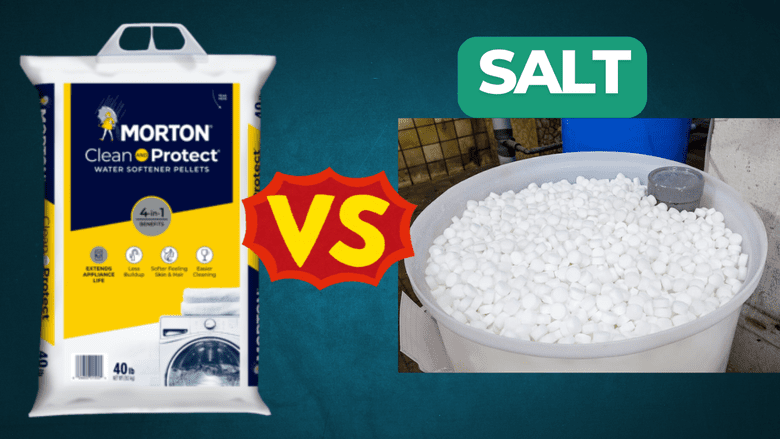Whats the Difference Between the Mortons Water Softner Salt?
When you’re choosing between Morton’s water softener salts, it’s important to understand the nuances that set them apart. Each type serves a specific purpose, from extending the life of your softener to catering to dietary restrictions. You might find that factors like purity and additives play a vital role in your decision. So, how do you determine which salt aligns best with your water needs and system specifications? Exploring the unique benefits and potential drawbacks of each option could provide the clarity you need.
Key Takeaways
- Types of Salt: Morton’s water softener salts include Clean and Protect, Pure and Natural, Solar Salt, Potassium Chloride, Rock Salt, and Evaporated Salt, each with unique properties.
- Sodium vs. Potassium: Sodium chloride is economical and widely available, while potassium chloride is a pricier, environmentally friendly alternative for sodium-restricted diets.
- Impurities: Clean and Protect Salt minimizes impurities, while Rock Salt may contain minerals that can affect performance in softening systems.
- Dissolution Rate: Evaporated Salt dissolves quickly, making it suitable for high-demand systems, while Solar Salt is harvested naturally and offers high purity.
- Compatibility: Not all salts suit every softener system; it’s essential to consult manufacturer recommendations and match salt types to local water hardness.
Overview of Morton’s Water Softener Salts
When you’re looking for an effective solution to combat hard water issues, understanding Morton’s water softener salts is crucial. These salts play a significant role in improving water quality by facilitating the softening process.
Hard water contains high levels of calcium and magnesium, which can lead to scale buildup in pipes and appliances, reducing their efficiency and lifespan.
Morton’s water softener salts effectively remove these minerals through ion exchange. During this process, sodium ions from the salt replace the calcium and magnesium ions in the water, resulting in softer water that’s less likely to cause scaling.
This not only extends the life of your plumbing and appliances but also enhances the effectiveness of detergents and soaps, leading to cleaner dishes and laundry.
To guarantee peak performance, it’s essential to choose the appropriate type of Morton’s salt for your specific softening system. Regularly replenishing the salt can maintain the efficiency of the softening process, guaranteeing consistent water quality.
Types of Morton’s Salt Products
Understanding the types of Morton’s salt products available is essential for selecting the right one for your water softening needs. Morton’s salt varieties cater to different preferences and system requirements, ensuring peak performance in water treatment.
One popular option is Morton’s Clean and Protect Water Softening Salt. This product is designed to minimize impurities and extend the life of your softener by preventing buildup in the system.
Another choice is Morton’s Pure and Natural Water Softener Salt, which contains no additives and is ideal for those seeking a more natural solution for their water treatment.
For those concerned with efficiency, Morton’s Solar Salt is a great alternative. Harvested from solar evaporation processes, it’s known for its high purity and effectiveness in softening water.
Furthermore, Morton’s Potassium Chloride is available for those wanting to replace sodium chloride, providing a less salty option while still addressing hardness in water.
Sodium Chloride vs. Potassium Chloride

Choosing the right salt for your water softener often comes down to understanding the differences between sodium chloride and potassium chloride.
Sodium chloride, commonly known as table salt, is the traditional choice for water softening. The sodium benefits include its cost-effectiveness and availability. It effectively removes hardness minerals like calcium and magnesium from your water, ensuring that your appliances and plumbing remain free from scale buildup.
On the other hand, potassium chloride serves as an alternative to sodium. One of the potassium advantages is that it’s a more environmentally friendly option, especially for those on sodium-restricted diets.
Potassium chloride performs similarly to sodium chloride regarding softening water, but it can be more expensive and less readily available.
When making your choice, consider your specific needs. If you’re looking for a budget-friendly option, sodium chloride might be your best bet.
However, if health concerns or environmental impact are priorities, potassium chloride offers a viable solution.
Ultimately, understanding these differences will help you make an informed decision for your water softening needs.
Benefits of Using Morton’s Salt
Using Morton’s salt for your water softening needs offers several advantages that can enhance both performance and convenience. One key benefit is its effectiveness in removing hardness minerals, like calcium and magnesium, from your water supply. This results in softer water, which can improve the efficiency of your household appliances, such as dishwashers and washing machines, leading to reduced energy consumption.
Additionally, using Morton’s salt can provide health benefits. Softened water is less likely to leave mineral deposits on your skin and hair, promoting better skin hydration and a healthier scalp. This can be especially beneficial for individuals with sensitive skin or dermatological conditions.
In terms of household applications, Morton’s salt is versatile. You can use it not only for water softening but also in various cleaning solutions, enhancing your home maintenance routine.
With its ready availability, you won’t have trouble sourcing it when you need to refill your softener. Overall, choosing Morton’s salt can simplify your household tasks while delivering tangible benefits for both your health and the longevity of your appliances.
Environmental Considerations

When considering the environmental impact of Morton’s water softener salt, it is important to recognize both its benefits and potential drawbacks. On one hand, Morton’s commitment to sustainable sourcing can reduce the ecological footprint of your water treatment process. By utilizing salt derived from renewable resources, you contribute to a more sustainable approach to water softening.
However, it is imperative to be aware of the potential environmental impact associated with the discharge of sodium and chloride into local waterways. These elements can lead to increased salinity, affecting aquatic life and ecosystems. Therefore, understanding the balance between benefits and drawbacks is essential.
Here’s a quick comparison of environmental considerations:
| Aspect | Detail |
|---|---|
| Sustainable Sourcing | Uses salt from renewable resources |
| Impact on Aquatic Life | High salinity can harm local ecosystems |
| Production Emissions | Lower emissions through responsible sourcing |
| Disposal Considerations | Must manage brine discharge carefully |
| Regulatory Compliance | Must adhere to local environmental laws |
Cost Comparison
Understanding the cost differences among Morton’s water softener salts can greatly impact your budgeting for water treatment. When you evaluate the options, it’s essential to conduct a thorough price comparison to determine which salt offers the best cost efficiency for your needs.
Typically, Morton’s offers several types of water softener salts, including traditional rock salt, evaporated salt, and potassium chloride. Each type comes with varying price points. For example, evaporated salt is usually more expensive than rock salt but tends to be more efficient regarding salt usage and maintenance of your system.
Conversely, while potassium chloride can be pricier, it serves as an alternative for those looking to avoid sodium.
You should consider not only the initial cost but also the long-term savings associated with each type. A more expensive salt that enhances your water system’s efficiency might save you money on maintenance and replacements over time.
Choosing the Right Salt for Your System

When selecting the right salt for your water softening system, it’s essential to understand the various types available and their specific applications.
Consider how each type of salt interacts with your system’s components to guarantee peak performance and longevity.
Making an informed choice will help you maintain efficiency and protect your investment.
Salt Types Overview
Choosing the right salt for your water softener is vital for peak performance and longevity of your system. When dealing with water hardness, the type of salt you choose can greatly impact how effectively your softener operates.
There are primarily three types of salt: rock salt, solar salt, and evaporated salt.
Rock salt is the most economical choice, but it often contains impurities that may contribute to mineral buildup in your system. If you’re looking for a cleaner option, solar salt is a great alternative. It’s harvested through evaporation of seawater and generally has fewer impurities, which can help reduce the risk of clogs and maintenance issues.
Evaporated salt is the purest form available, containing nearly 100% sodium chloride. This type minimizes mineral buildup and is ideal for those with high water hardness levels. While it may be more expensive, the efficiency and fewer maintenance needs can justify the cost.
Ultimately, selecting the appropriate salt type is essential for ensuring your water softener effectively combats mineral buildup and maintains peak performance. Take the time to evaluate your specific needs before making a decision.
System Compatibility Considerations

Many homeowners may not realize that not all water softener salts are compatible with every system. Choosing the right salt is essential for maintaining peak system efficiency and prolonging the lifespan of your water softener. Compatibility factors include the type of resin your system uses, the hardness of your water, and the manufacturer’s recommendations.
For instance, if your system is designed for sodium chloride, using potassium chloride may not yield the desired results. This discrepancy can lead to insufficient softening, increased maintenance costs, and even damage to the unit. Moreover, some systems can handle specific types of salt better, enhancing overall performance.
When selecting salt, always consult your user manual or the manufacturer’s guidelines. These documents often provide insights into the best salt types that promote system efficiency.
You should also consider the geographic area and local water quality, as these can influence the effectiveness of certain salts.
Tips for Using Water Softener Salt
When using water softener salt, it’s essential to choose the right type that matches your system’s requirements.
Moreover, proper storage practices can greatly affect the salt’s effectiveness and longevity.
Choosing the Right Salt Type
Selecting the right type of water softener salt can greatly enhance the efficiency of your water softening system. When choosing salt, consider your water quality factors, such as hardness level and impurities, as these will influence your salt selection strategies.
Here’s a quick reference table to help you make an informed choice:
| Type of Salt | Advantages | Considerations |
|---|---|---|
| Rock Salt | Cost-effective, good for large systems | May contain impurities |
| Solar Salt | Purified through solar evaporation, fewer impurities | Slightly more expensive than rock salt |
| Evaporated Salt | Highly pure, dissolves quickly | Higher cost, ideal for softeners with high demand |
Proper Storage Practices
To maximize the efficiency of your water softening system, proper storage of water softener salt is vital. Start by selecting appropriate storage containers that are airtight and moisture-resistant to prevent clumping or caking.
Look for containers made from durable materials, such as plastic or metal, that can withstand environmental factors.
Humidity control is important when storing salt. Keep the containers in a cool, dry place, away from direct sunlight and sources of moisture. Excess humidity can lead to salt absorbing moisture, making it less effective for your water softener.
If you live in a particularly humid area, consider using desiccants or moisture-absorbing packets inside the containers to further mitigate humidity issues.
It’s also advisable to store only the amount of salt you need for immediate use. This practice not only guarantees freshness but also minimizes the risk of prolonged exposure to unfavorable conditions.
Finally, periodically check your storage containers for integrity and signs of contamination. By following these practices, you’ll guarantee your water softener salt remains effective and your system operates at peak performance.
Frequently Asked Questions
Can I Mix Different Types of Morton’s Salt?
You can mix different salt types from Morton’s, but guarantee compatibility. Mixing salts can affect performance and efficiency, so check product specifications for ideal results. Always follow manufacturer guidelines for best practices in your applications.
How Often Should I Refill My Water Softener Salt?
You might wonder how often to refill your water softener salt. Generally, it’s advisable to check your salt levels monthly, adjusting for water softener usage, and refill as needed to guarantee peak operation and efficiency.
Does Morton’s Salt Have an Expiration Date?
Morton’s salt doesn’t have an official expiration date; however, for ideal performance, consider it within its product shelf life. Storing it in a cool, dry place helps prevent clumping and maintains its effectiveness against expiration concerns.
Is Morton’s Salt Safe for Drinking Water?
Morton’s salt isn’t designed for drinking water safety. While it undergoes salt purification processes, it’s crucial to ascertain your water source meets safety standards. Always check local regulations and guidelines before consumption.
How Do I Store Morton’s Water Softener Salt?
Improper salt storage can lead to a 30% decrease in effectiveness. To guarantee ideal moisture control, keep your Morton’s water softener salt in a cool, dry place, tightly sealed, and away from direct sunlight.
Conclusion
In choosing the right Morton’s water softener salt, you’re not just picking a product; you’re crafting the foundation for softer, cleaner water in your home. Each type serves a unique purpose, like pieces of a puzzle fitting together to create a perfect solution for your water needs. By understanding the differences and benefits, you can guarantee your system runs efficiently while prolonging its life. So, explore your options and make an informed choice for peak performance.







